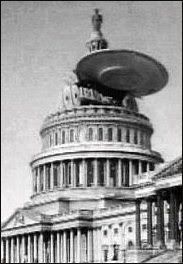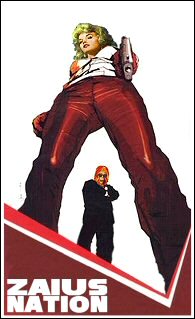Take a walk with me down memory lane...
President wants Senate to hurry with new anti-terrorism laws
July 30, 1996
WASHINGTON (CNN) -- President Clinton urged Congress Tuesday to act swiftly in developing anti-terrorism legislation before its August recess.
"We need to keep this country together right now. We need to focus on this terrorism issue," Clinton said during a White House news conference.
But while the president pushed for quick legislation, Republican lawmakers hardened their stance against some of the proposed anti-terrorism measures.

Senate Majority Leader Trent Lott, R-Mississippi, doubted that the Senate would rush to action before they recess this weekend. The Senate needs to study all the options, he said, and trying to get it done in the next three days would be tough.
One key GOP senator was more critical, calling a proposed study of chemical markers in explosives "a phony issue."
Taggants value disputed
Clinton said he knew there was Republican opposition to his proposal on explosive taggants, but it should not be allowed to block the provisions on which both parties agree.
"What I urge them to do is to be explicit about their disagreement, but don't let it overcome the areas of agreement," he said.
The president emphasized coming to terms on specific areas of disagreement would help move the legislation along. The president stressed it's important to get the legislation out before the weekend's recess, especially following the bombing of Centennial Olympic Park and the crash of TWA Flight 800.
"The most important thing right now is that they get the best, strongest bill they can out -- that they give us as much help as they can," he said.
Hatch blasts 'phony' issues
Republican leaders earlier met with White House Chief of Staff Leon Panetta for about an hour in response to the president's call for "the very best ideas" for fighting terrorism.
Sen. Orrin Hatch, R-Utah, chairman of the Senate Judiciary Committee, emerged from the meeting and said, "These are very controversial provisions that the White House wants. Some they're not going to get."
Hatch called Clinton's proposed study of taggants -- chemical markers in explosives that could help track terrorists -- "a phony issue."
"If they want to, they can study the thing" already, Hatch asserted. He also said he had some problems with the president's proposals to expand wiretapping.
Senate Minority Leader Tom Daschle, D-South Dakota, said it is a mistake if Congress leaves town without addressing anti-terrorism legislation. Daschle is expected to hold a special meeting on the matter Wednesday with Congressional leaders.
The Associated Press contributed to this report.
cnn.com/clinton.terrorism
Anti-terrorism bill gutted in House
March 13, 1996
Jeanne Meserve
WASHINGTON (CNN) -- The first anniversary of the Oklahoma City bombing is next month, and Congress has yet to enact anti-terrorism legislation urgently proposed by the president. The House Wednesday voted to amend the bill to take out some of the it's toughest and most controversial provisions.
The House of Representatives ripped the guts out of pending anti-terrorism legislation with a single vote Wednesday. Passing 246-171, the amendment deletes provisions which would:
- Allow the government to label certain groups as "terrorist."
- Streamline the deportation of terrorists.
- Allow the use of wiretap evidence obtained without a warrant.
- Permit disclosure of certain consumer reports to the FBI.
The amendment was backed by an unusual alliance of groups on the right and left who felt the original bill gave the federal government too much power.
"What price are we willing to pay in terms of our individual rights and freedoms? What price are we willing to pay as citizens of this country?" Rep. Melvin Watt, D-North Carolina, said from the floor.
Adoption of the amendment could hardly have come at a more embarrassing time for President Clinton, who was co-hosting an international anti-terrorism summit in Egypt Wednesday.
Attorney General Janet Reno criticized the changes to the bill. "Congress' action keeps too many Americans vulnerable to terrorists and madmen by stripping away provisions that might have helped save law enforcement from killer bullets and help trace explosives."
The anti-terrorism legislation was introduced at the president's urging in the aftermath of the April 19 Oklahoma City bombing, which killed 168 men, women, and children.
But some anti-terrorism experts said that before the legislation was amended, it wouldn't have done much to combat terrorism.
"It is, at best, a Christmas tree. A Christmas tree is designed to do what? It was designed to reassure the American public that the government is doing something," said terrorism expert Larry Johnson.
Last June, the Senate passed anti-terrorism legislation that included many of the provisions deleted by the House. The White House will be lobbying to have those measures re-inserted when congressional conferences produce a final version of the legislation.
cnn.com/US/9603/terrorism_bill/13/





















0 Comments:
Post a Comment
<< Home